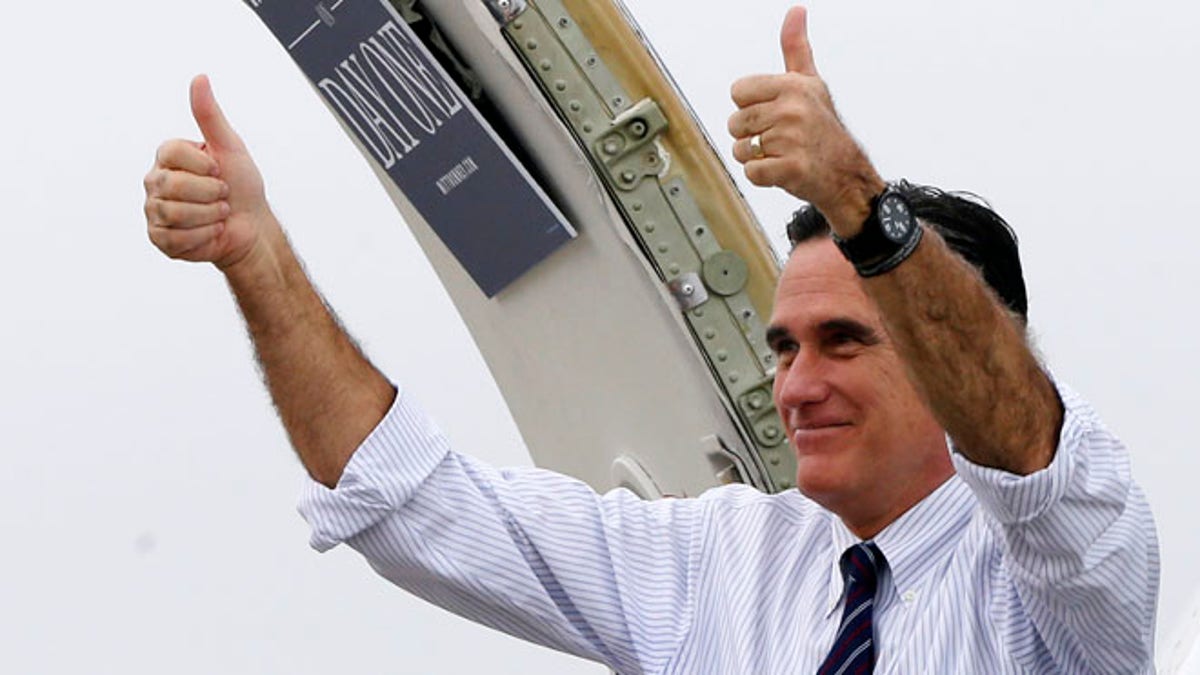
Nov. 5, 2012: Republican presidential candidate, former Massachusetts Gov. Mitt Romney gives two thumbs up as he boards his campaign plane. (AP)
Campaigns fight for votes by putting forward bold objectives-like reforming the tax code-and with exaggerated scaremongering -- that Governor Romney will cut taxes 20% with no offsetting reduction in deductions --when, in truth, change occurs incrementally at the margin. Eliminating deductions will be very difficult and nobody is going to cut taxes with a $1.1 trillion-a-year deficit. What hangs in the balance is not whose bold vision will or won't pass but rather how pushes and pulls at the margin best serve middle class interests.
ObamaCare, for example, won't be repealed unless Republicans win a highly unlikely filibuster-proof majority. It will be implemented with either zeal or restraint. From that perspective, here are five reasons why a Romney presidency would be better for growth, employment and the middle class than reelecting President Obama.
1) Federal government spending has risen from 20% of GDP in 2007 to an unprecedented 24% today. While increases in government spending might temporarily boast GDP in the short run, in the long run reductions in private sector spending offset increases in government spending. Look at Europe.
Today, Germany and France have 35% to 40% fewer hours of work per working age adult than the United States, according to statistics collected by the U.S. Bureau of Labor Statistics. Four years after the financial crisis, it's no longer the short run.
Belief in the possibility of a short-term rebound has faded. We need sustainable increases in growth. Private sector growth will benefit from moderation in public sector spending. Instead, President Obama has vehemently opposed spending cuts at every turn. He opposed Simpson- Bowles and fought spending cuts in the debt ceiling negotiations. That's consistent with his goal of increasing, rather than reducing, government spending on behalf of his constituents.
Today, with spending at 24% of GDP, we need a president who is more likely to rein in spending on the margin.
2) With thousand of pages of new regulations, ObamaCare and Dodd-Frank have put an enormous regulatory strain and increased uncertainty on the private sector. This has slowed growth and increased unemployment. Without a filibuster-proof Republican majority, these programs will not be repealed. Instead, growth would benefit from more prudent application of these regulations and, in some places, even bipartisan pruning of some of their less productive excess. Who is more likely to do that, President Obama, who advocated every page of these regulations, or Governor Romney, who will take a fresh look from a pro-growth perspective?
3) Unless one political party achieves a filibuster-proof majority, nothing gets done federally without bipartisan compromise. By design, our government requires the president to secure some support from the opposite side of the aisle to initiate change. Who is more likely to hammer out a compromise?
President Obama, who rammed far reaching health care legislation through Congress using legislative reconciliation rather than compromise and who has failed to produce any significant bipartisan compromises over his four year tenure, or Governor Romney, who successfully worked with his 85% Democratic Massachusetts legislature to produce landmark legislation?
Success in the private sector demands compromise. Competition defeats excuses. Governor Romney's extraordinary private and public sector success demonstrates his skill and willingness to negotiate compromise.
4) Low-cost domestic energy represents one of the few opportunities for the United States to accelerate growth. President Obama rejected the Keystone Pipeline. He has slowed drilling on public land and increased regulatory uncertainty in the energy sector. Governor Romney will take steps to accelerate domestic energy production. His actions in Massachusetts demonstrate that he takes environmental concerns seriously.
5) Given the unprecedented level of spending, the explosion in regulation, and the unwillingness or inability to hammer out compromise, even on energy, any shift on the margin to rein in President Obama's excesses, especially from a leader with a proven track record of compromise, is likely to boost business confidence and investment at a time when we need growth. Governor Romney's election would provide that boost.
The Obama presidency used its initial filibuster-proof majority to make extreme changes. The Massachusetts electorate and the midterm election halted further gains. Despite heavy election losses, President Obama has fought to hold on to these gains. A step back toward the middle would be a step in the right direction. A Romney presidency is far more likely to take that step.
Ed Conard, is a former managing director of Bain Capital, and the author of "Unintended Consequences: Why Everything You've Been Told About the Economy Is Wrong" (Portfolio, 2012).
